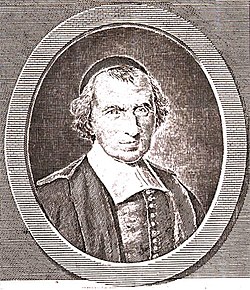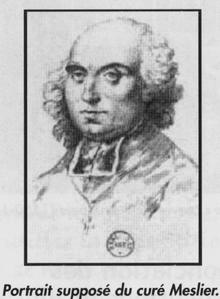Jean Meslier
Jean Meslier ( Jean Mellier Melje ) ( born June 15, 1664 Mazerny; † in early summer 1729 in Étrépigny ) was a French Catholic priest ( curé; abbé ) from the time of the early Enlightenment, before Julien Offray de La Mettrie (L ' homme machine, 1748) wrote of a consistently materialistic, atheistic point of view, a radical churches and religious criticism. His lifetime unpublished manuscript circulated clandestinely and exerted a strong influence on the French Enlightenment of the 18th century from. An unabridged edition of his testament was first published in 1864 in Amsterdam.
Life
Jean Meslier was born in Mazerny in the Ardennes, the son of a cloth merchant, of Gérard Mellier (ca. 1626-1706 ) and his wife Symphorienne Braidy (ca. 1623-1706 ). He had three sisters, Jeanne (* 1655), Antoinette ( 1670-1737 ) and Marie Mellier (* 1672). A master of the school, maître d' école taught him before the age of eight read and write, by a priest, he learned Latin. At the age of 25, he became pastor of the nearby village Étrépigny. On January 7, 1689 and was ordained a priest. The priestly office he held until his death in 1729.
Meslier was outraged about the poor treatment of the farmers of his community by the noble lord Antoine de Toullyund denounced this also in his sermons. The nobleman complained to the competent bishop and the parish priest of post received a reprimand with certain conditions. But this did not Mesliers entertainment and public criticism. On the re- actions of the landlord Toully towards the village priest was quoted as Archbishop to Reims and thoroughly taken to task so thoroughly that Meslier never dared again to publicly criticize.
But the pressurized village pastor had no intention of giving up the resistance. Rather, he began to lead a double life. Outwardly he was doing his duty, but secretly he wrote a manuscript religion critical of well over a thousand pages. In form it is a sermon series baroque style, intended for his church, the intention by an appeal to all " people of spirit and authority, the Party of Justice and the truth should be taken and the bad mistakes and states, the vile superstitions to denounce and all the odious tyranny and to fight until they were destroyed. "
Work
Mesliers work is divided into eight parts: 1 Religions " are all only human inventions "; 2 " blind faith " is the principle of all error and all illusions; 3 falsity of the "supposedly divine visions and revelations "; 4 " vanity and falsity of the alleged prophecies of the Old Testament "; 5 " errors of doctrine and morals of the Christian religion "; 6 " The Christian religion condones the abuses and tyranny of the great lords "; 7 falsity of the alleged " existence of gods "; 8 falsity of the idea of spirituality and immortality of the soul.
Meslier wrote his work in his last decade of life, for he is Fenelon's book Demonstration de l' existence de Dieu (1718 ) advance and refuted the proofs of God, one after the other.
Meslier himself made of his work in three nearly identical copies. Soon circulated copies in Paris, of course, only under the hand. No one dared to printing, for the book would have been immediately confiscated and burned. For people with flair and money it was still not too difficult to get a copy. Voltaire was rich and resourceful enough to raise a complete manuscript. It speaks for Voltaire, that he recognized the value of the find. He let circulate the " witness of truth " among the encyclopedist.
In 1762, Voltaire, without giving his identity as a publisher, publish revised excerpts from Mesliers work. Mesliers original radical atheism is found in the edition of Voltaire's deism to carefully mitigated: His version contained no criticism more on the needle or on Christianity itself, but directed only against the abuse of power of the Church and excessive superstition. Baron d' Holbach also published a paper on Meslier and his work (Le bon sens du Curé Jean Meslier suivi de son testament 1772). A complete edition was published in 1864 in three volumes in Amsterdam, edited by Rudolf Charles ( he used only his first name ), the pseudonym of Rudolf Charles d' Ablaing van Giessen castle. The authoritative edition is that of Albert Soboul 1972 and created others due to the original manuscripts.
His will makes Meslier one of the outstanding forerunner of the Age of Enlightenment. In modern times Meslier was the first who took an uncompromising atheism. At the same time developed an early Meslier a rigorous materialism and an embossed by anarchist and socialist thought conception of society.
Werkausgaben
- Jean Meslier Oeuvres completes, edited by J. Deprun, R. Desne, A. Soboul, 3 volumes, Paris, 1970-1972
- The Testament of Abbe Meslier, ed. and inlaid. v. Guenther Mensching, trans. Angelika v. Oppenheimer. Frankfurt / Main: Suhrkamp, 1976 ISBN 3-518-06000-7; new ed. and inlaid. v. Hartmut Krauss. Osnabrück: background Verlag 2005 ISBN 3-00-015292- X










